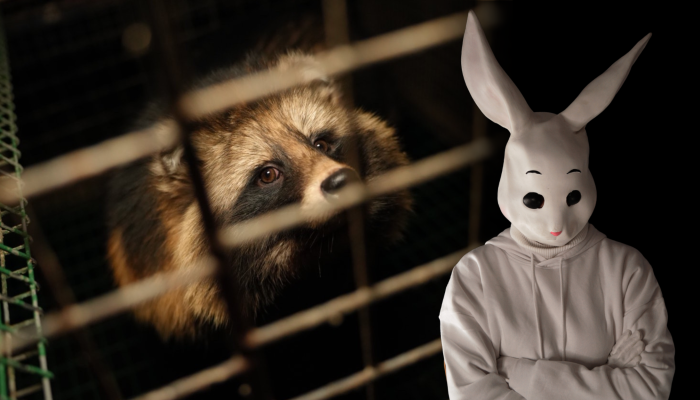
Although fur farming has been banned in all three regions of Belgium since 2023, the sale of fur remains legal, sustaining an industry that sacrifices 7 million fur-bearing animals in Europe every year. According to a recent poll, 3 out of 4 Belgians believe policymakers should ban its commercialisation.
Today, GAIA reveals harrowing footage exposing the grim reality, cruel practices, and brutal killing methods of the fur industry.
*The campaign is available in French and Dutch. The article includes a link to the campaign website and the video report in French, which can also be viewed in Dutch but not in English.

Bunny: The Anonymous Whistleblower Exposing the Truth About the Fur Industry
Bunny is the key witness in GAIA’s new campaign, exposing the scandal of the fur industry. For several weeks, on www.stoplvmh.be, Bunny will reveal the brutal reality of animals bred for their fur through video reports, shedding light on the role of the LVMH group in this scandal.
Visit www.stoplvmh.be to learn more.
GAIA’s Footage Exposes the Horror of Fur Farms
As part of an investigation across several European countries, GAIA reveals footage filmed last January in Poland, one of Europe’s largest fur producers. The images expose the cruelty of the fur industry and reflect the standard practices in farms across Europe—farms that continue to supply the fur market.
Wire Floors Instead of Solid Ground
Minks, foxes, and raccoons —the main victims of this industry—are confined to tiny metal cages of less than one square meter. Suspended above the ground, these cages allow waste to fall directly below. With no solid surface to stand on, their paws are constantly in contact with metal bars, leaving them vulnerable to injuries and constant suffering.
A Fatty Gruel for Maximum Profit
Fed an abundance of fatty gruel and deprived of any movement, the animals develop extreme obesity— the larger their fur, the higher its market value.
The conditions in fur farms prevent them from expressing natural behaviors like exploring, hunting, or running. This leads to severe behavioral disorders, including self-mutilation, cannibalism, and obsessive, repetitive movements.
A Death as Cruel as Their Captivity
The animals never leave their cages—except to be killed when they are just a few months old. The footage also reveals particularly brutal killing methods, where raccoon dogs are violently dragged from their cages and anally electrocuted, all while other animals watch in terror from nearby cages—a practice that is both illegal and inhumane.

A declining industry, but still present
Over the past decade, fur production in Europe has declined by 75%—from 44 million animals killed in 2013 to seven million in 2023, including 6.4 million mink, 390,000 foxes, and 50,000 raccoon dogs.
Even in China, one of the world’s largest fur producers, the decline is evident: production in 2023 dropped by more than half compared to the previous year.
Fifteen EU countries, including Slovenia, the Czech Republic, and the Netherlands, have banned fur farming. In Belgium, the practice was gradually phased out. Wallonia was the first region to prohibit fur farming in 2015, followed by Brussels in 2017. In 2018, Flanders—the only region where fur farms were still active—introduced a decree to fully ban the sector by the end of 2023. This nationwide ban now spares 150,000 mink annually from the cruelties seen in GAIA’s footage.
Although fur farming is no longer allowed in Belgium, fur clothing and accessories are still available in luxury brands and specialised stores. This must stop.
"Belgium must no longer be complicit in this industry. We have banned its production—now it is time to ban its sale as well."
LVMH continues despite massive public opposition
While many fashion brands—including Dolce & Gabbana, Prada, Gucci, and more recently Max Mara—have turned their backs on fur, some luxury brands, such as the LVMH group (Louis Vuitton, Dior, ...), continue to use it, despite overwhelming public opposition to fur.
Nearly 3 out of 4 Belgians want the trade banned
A new opinion poll by Dedicated (January 2025), commissioned by GAIA, reveals that 73% of Belgians want the country to ban its sale altogether.
- 70% of Belgians believe their political party should support this ban.
- More than 3 in 4 Belgians find the use of fur by brands unacceptable.
- 76% think that selling fur harms the image of luxury brands.
- Nearly 2 in 3 Belgians say they would avoid buying products from other brands within the same group.
A serious health risk
Fur farms also pose a public health risk. During the COVID-19 pandemic, hundreds of mink farms were affected by the coronavirus, with animals transmitting new variants of the SARS-CoV-2 virus to humans.
Recent developments show that this risk has not disappeared: in October 2024, a new coronavirus outbreak was detected at a fur farm in Italy.
GAIA Calls for a Ban on Fur Sales in Belgium
Today, GAIA launches a campaign urging regional governments—who have the authority to act—to ban fur sales. The organization also calls on citizens to boycott brands that continue to use fur.
Discover Bunny and our fight against the fur industry at www.stoplvmh.be!